Medical Office Specialist Resume Examples

Mar 26, 2025
|
12 min read
Craft a compelling medical office specialist resume that diagnoses success. Learn the essentials to organize your skills and experience, ensuring your application is prescribed the attention it deserves in the healthcare industry.
Rated by 348 people
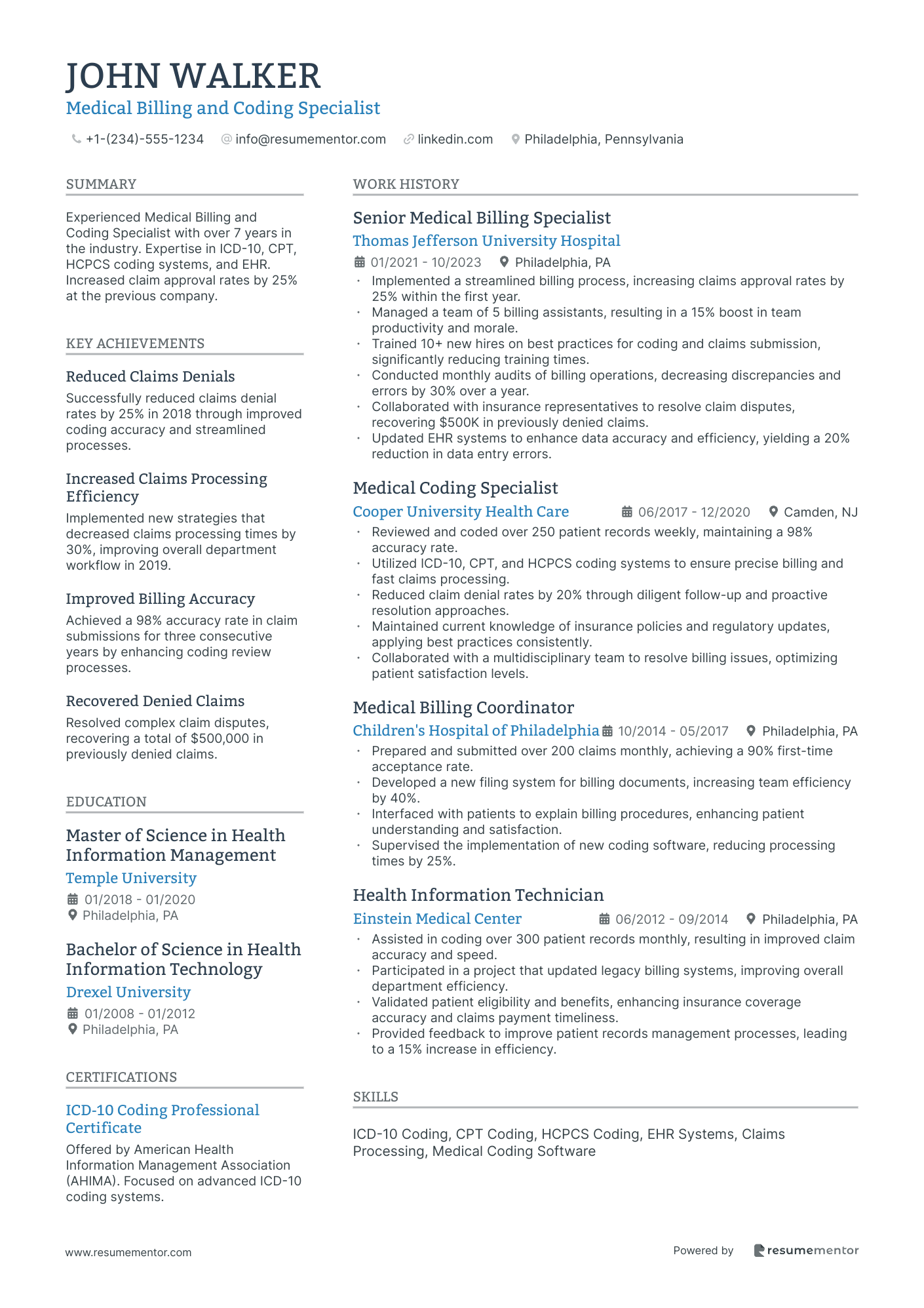
Medical Billing and Coding Specialist
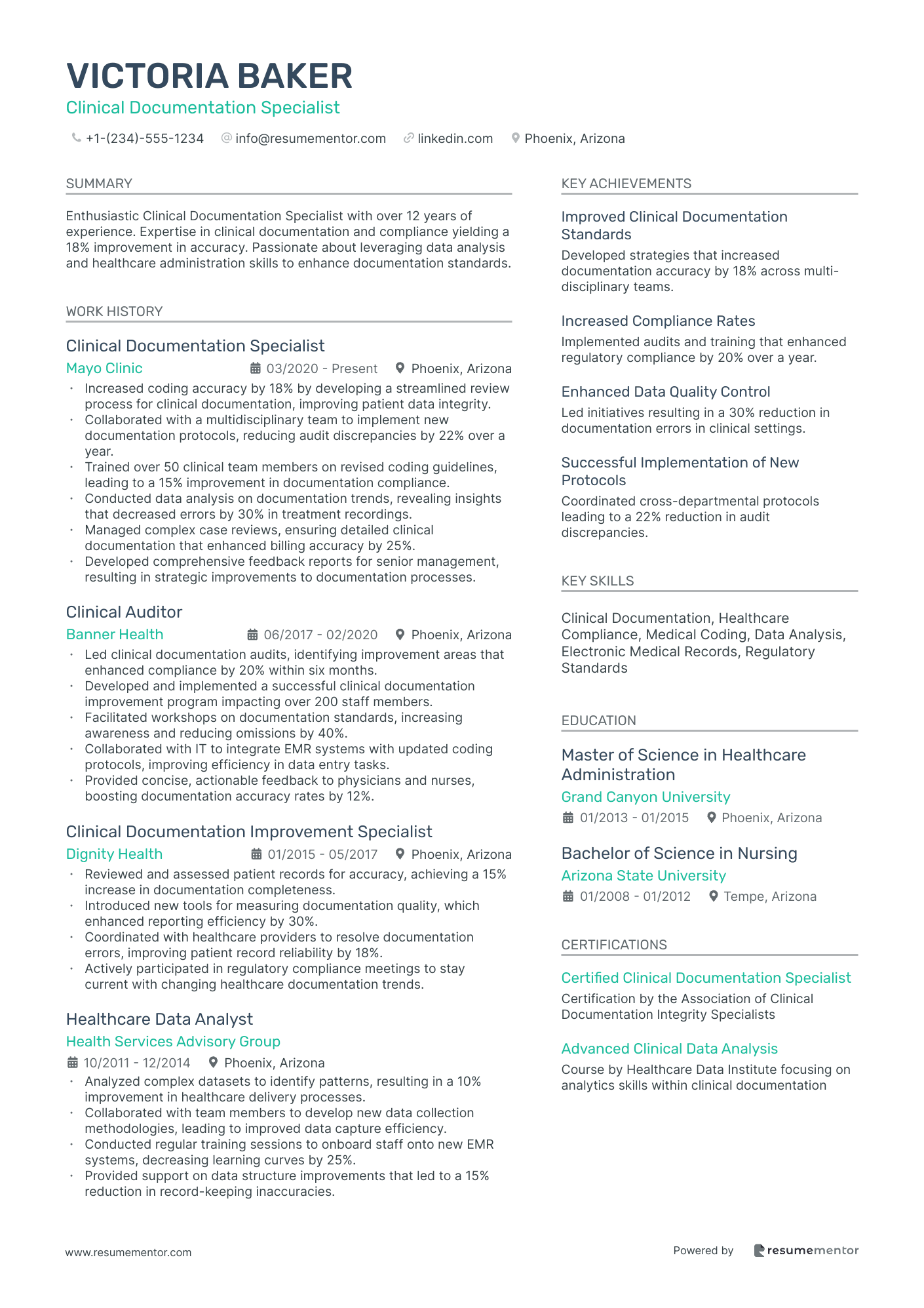
Clinical Documentation Specialist
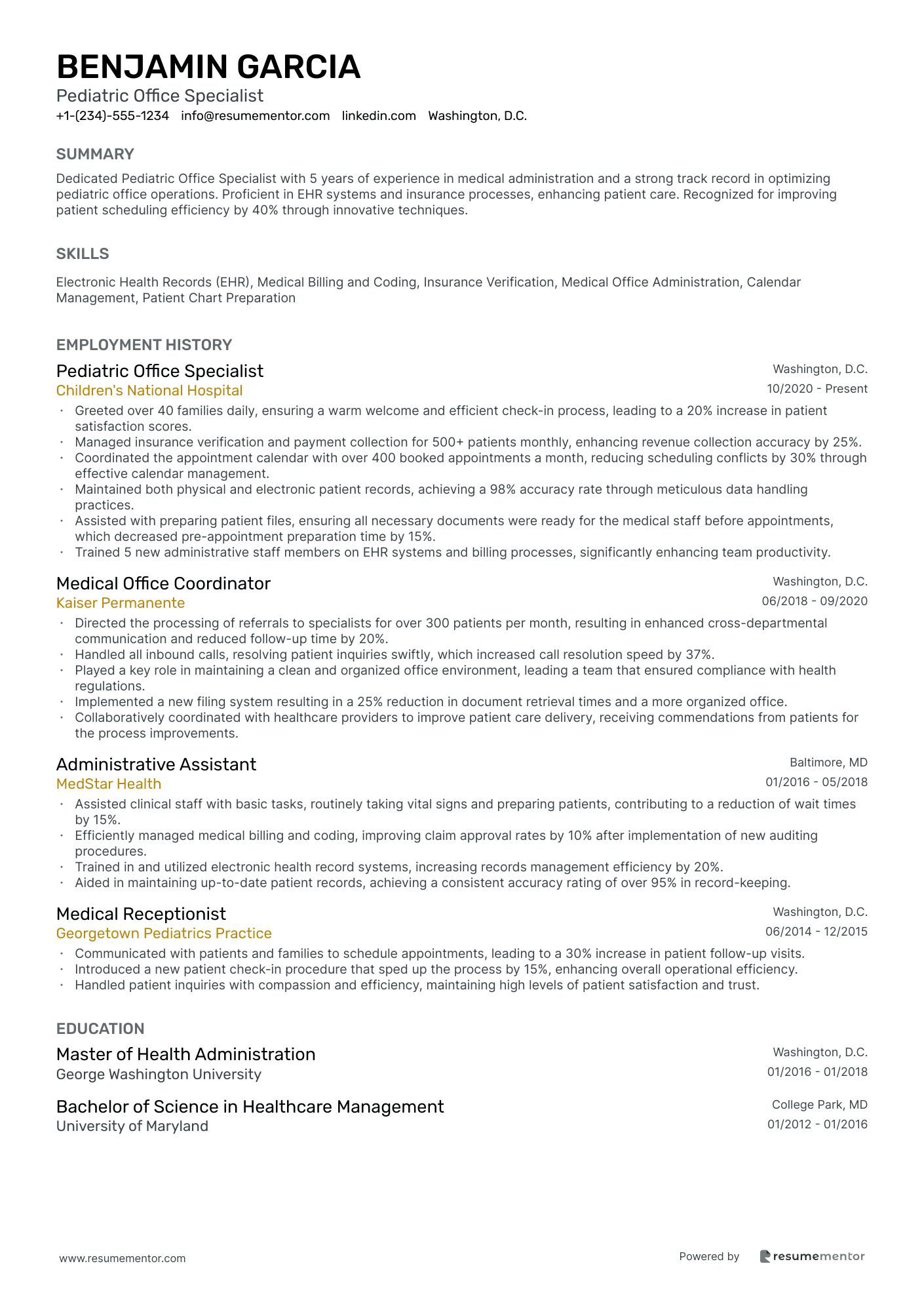
Pediatric Office Specialist
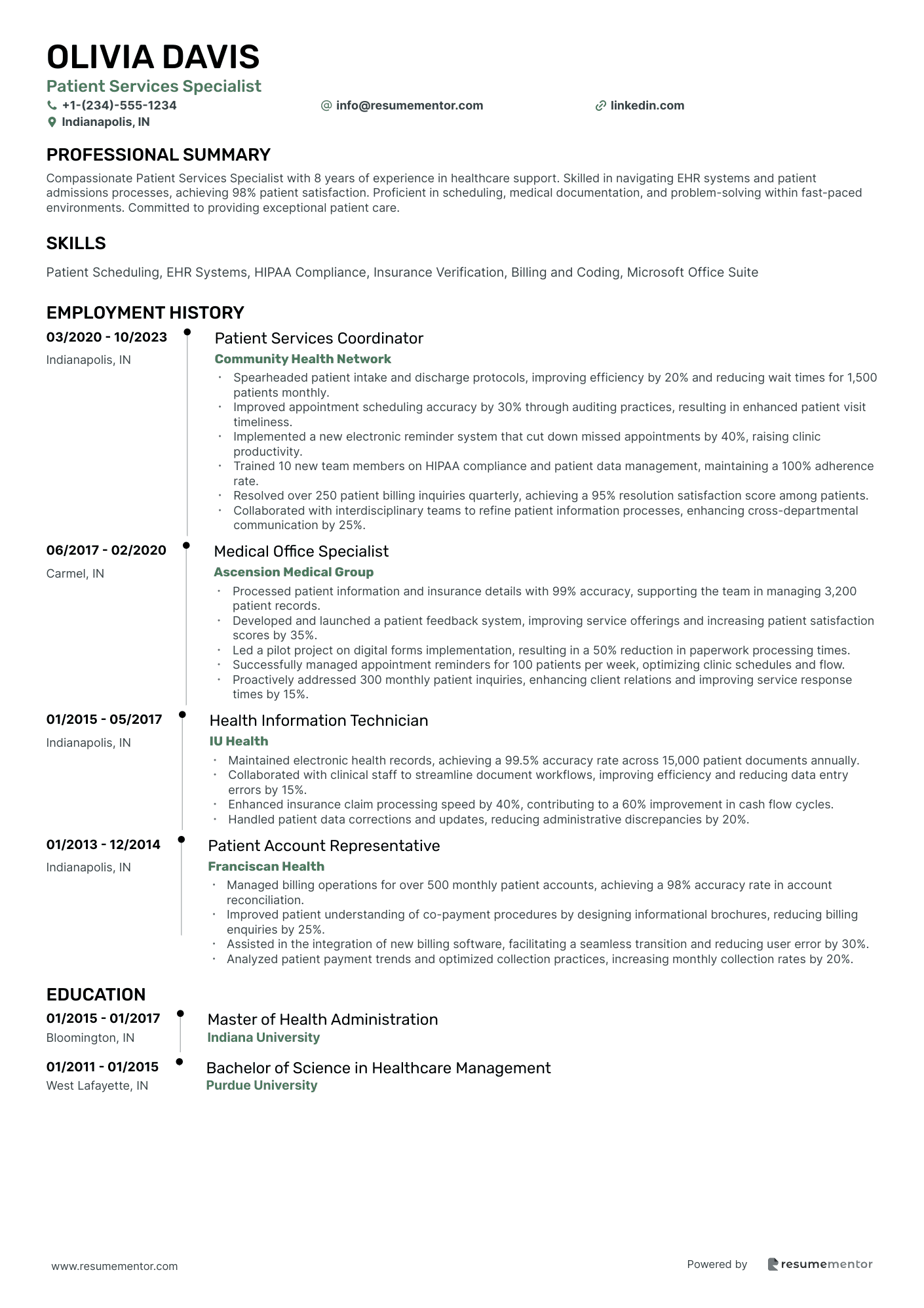
Patient Services Specialist
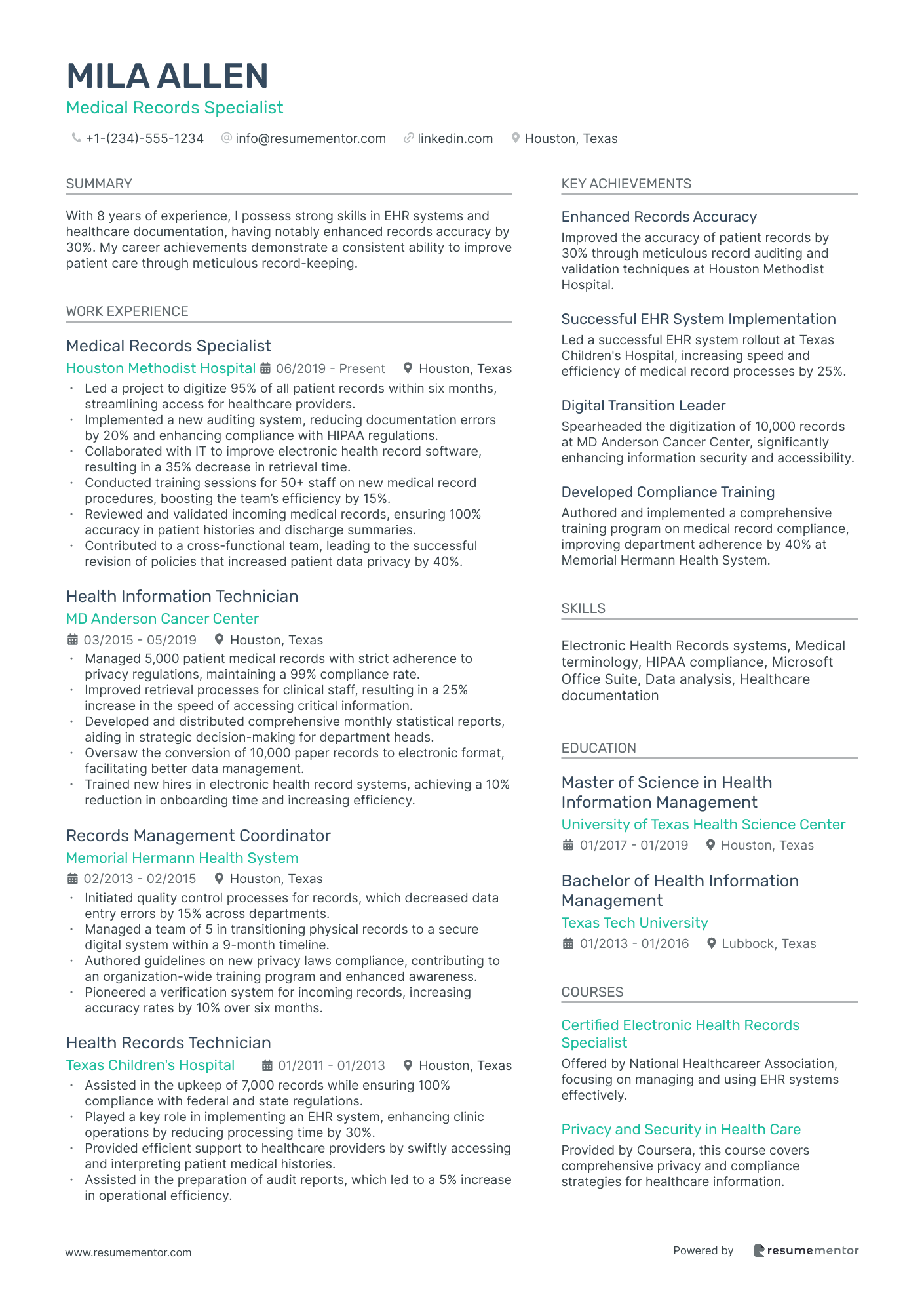
Medical Records Specialist
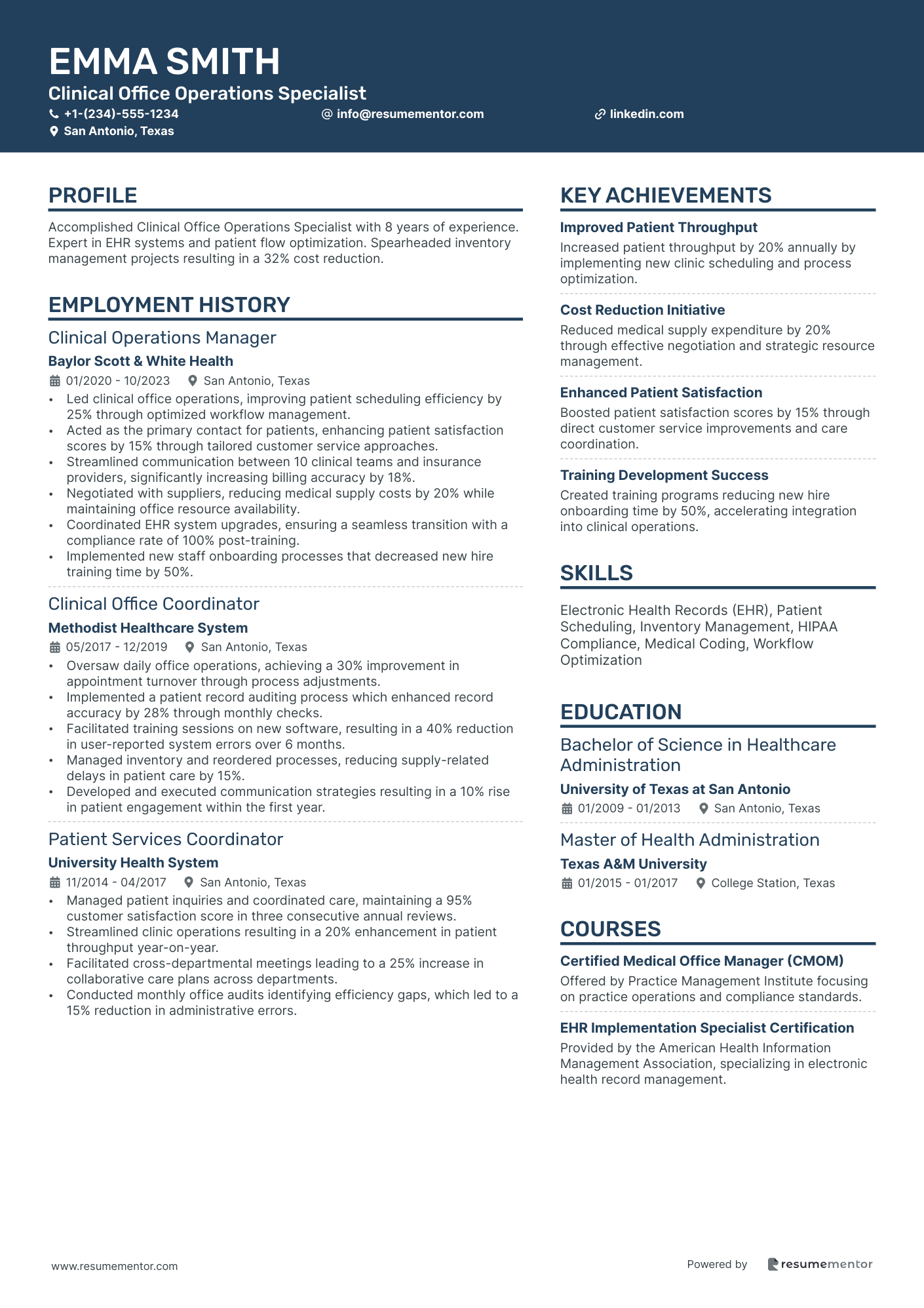
Clinical Office Operations Specialist
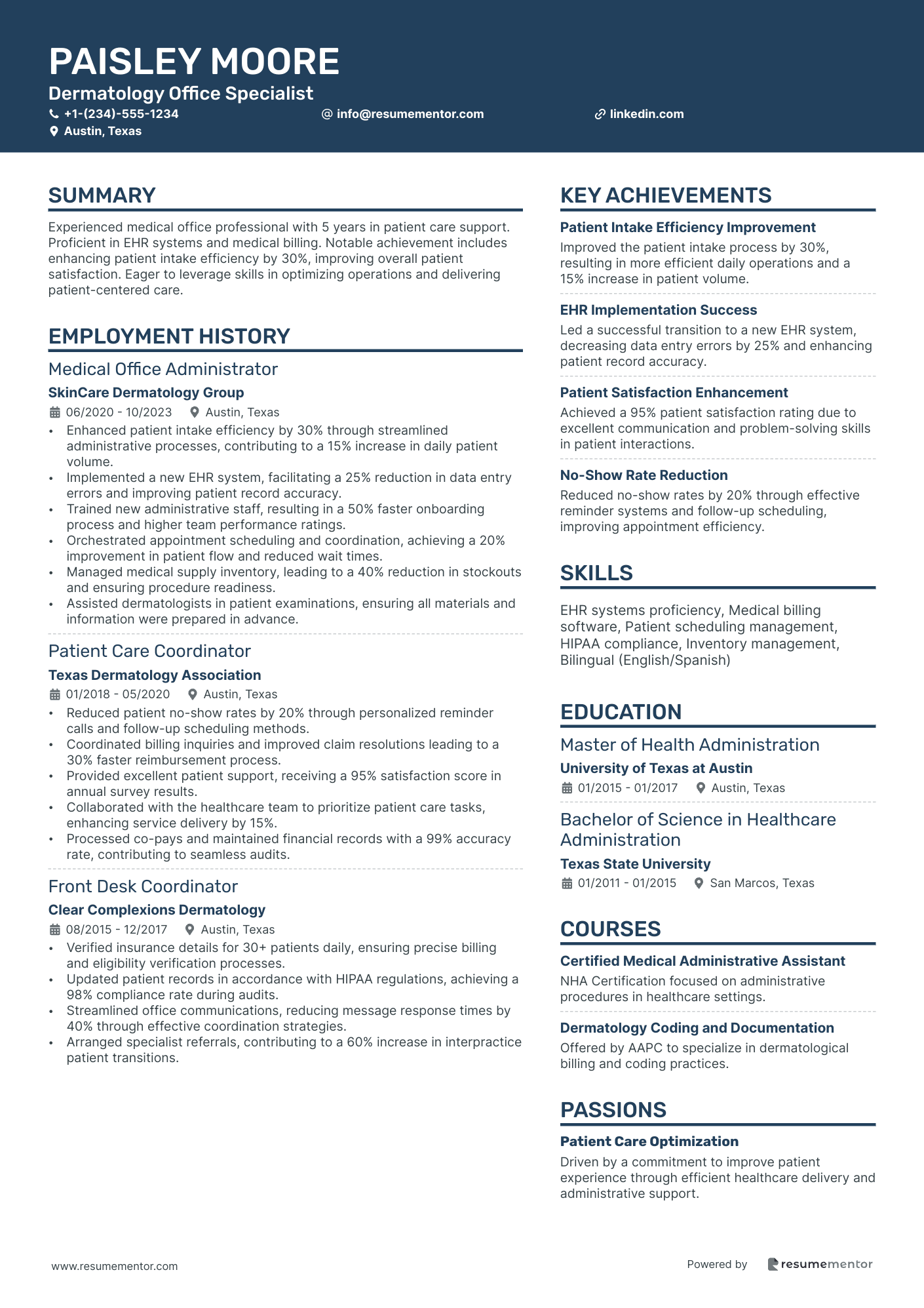
Dermatology Office Specialist
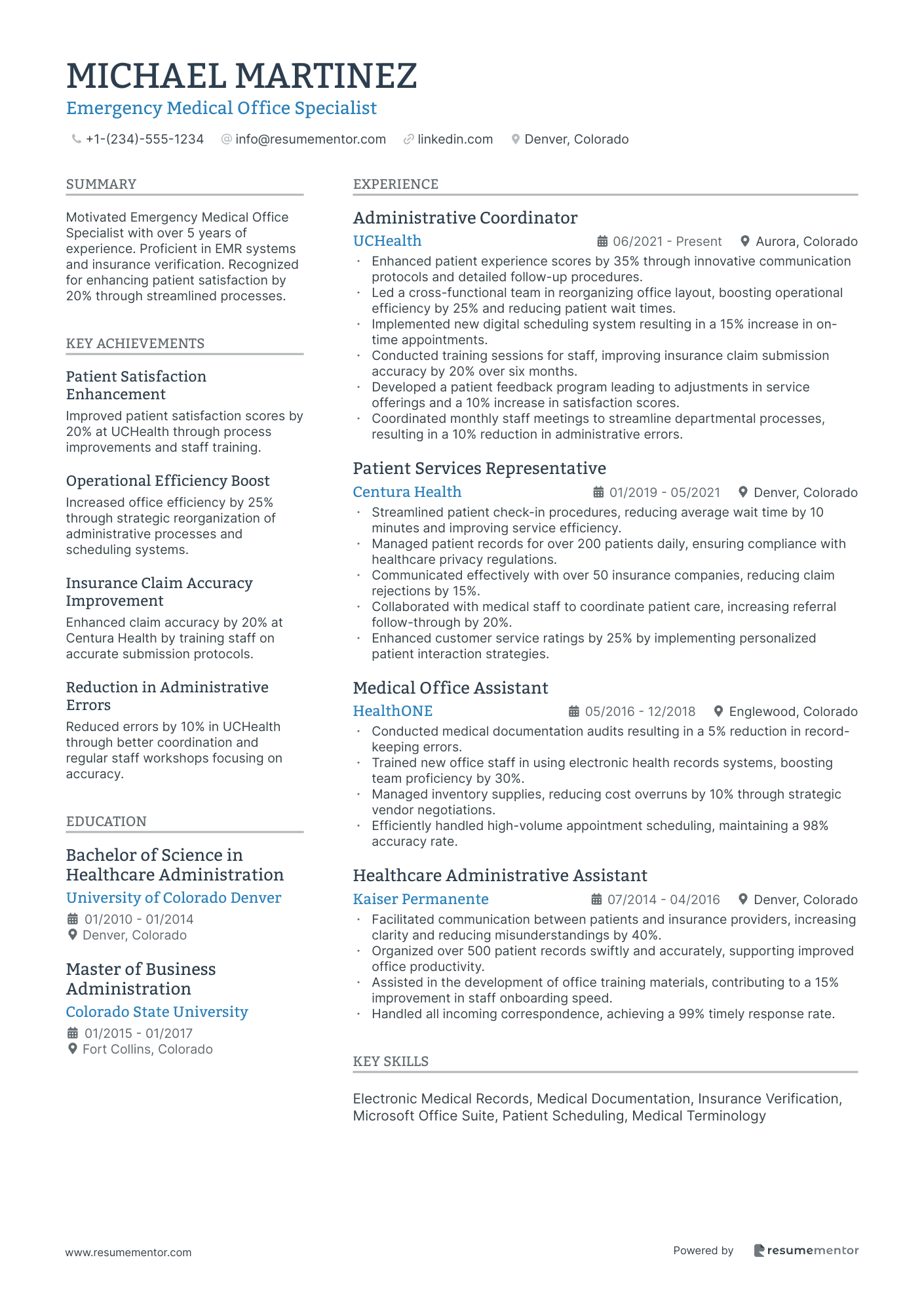
Emergency Medical Office Specialist
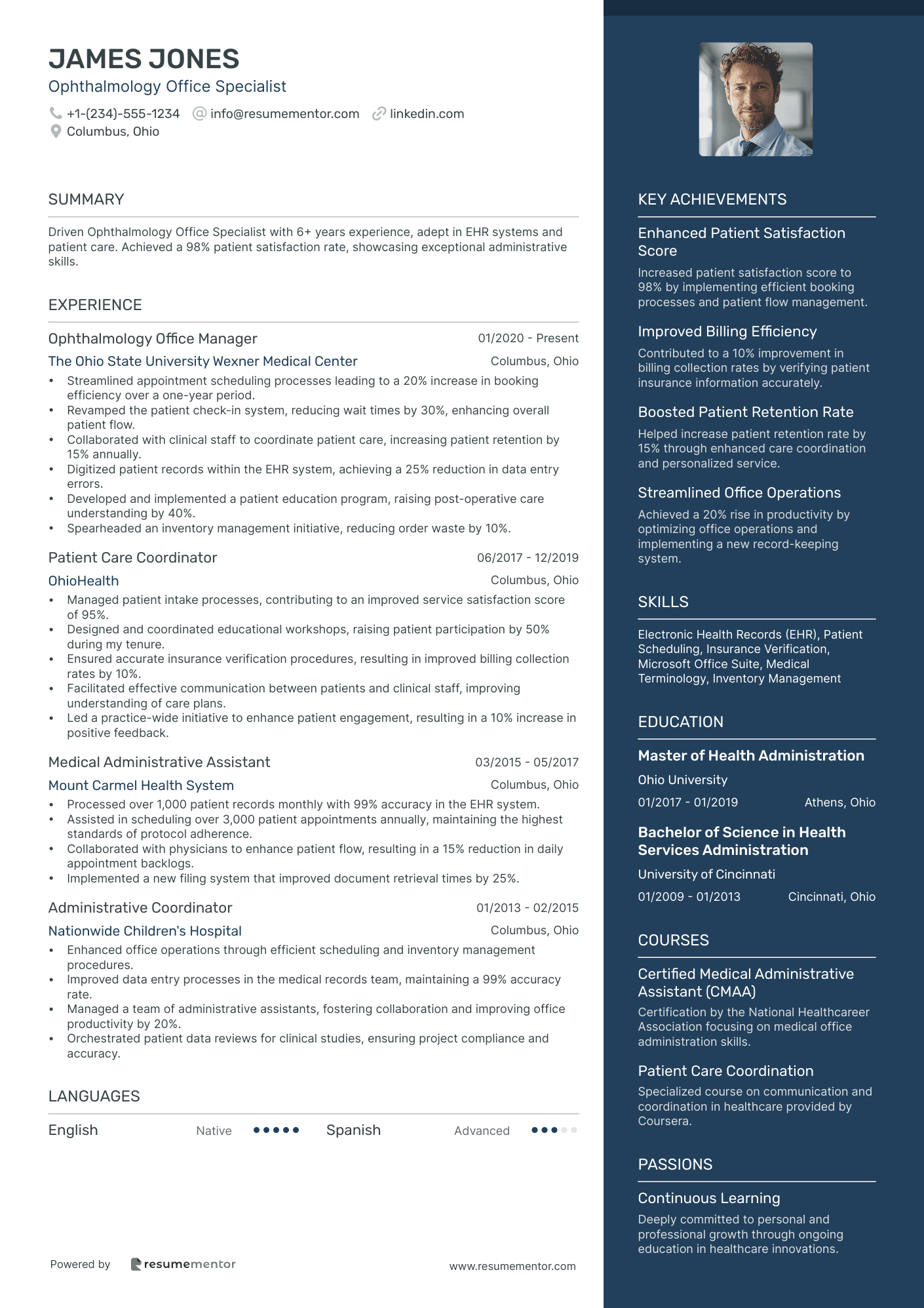
Ophthalmology Office Specialist
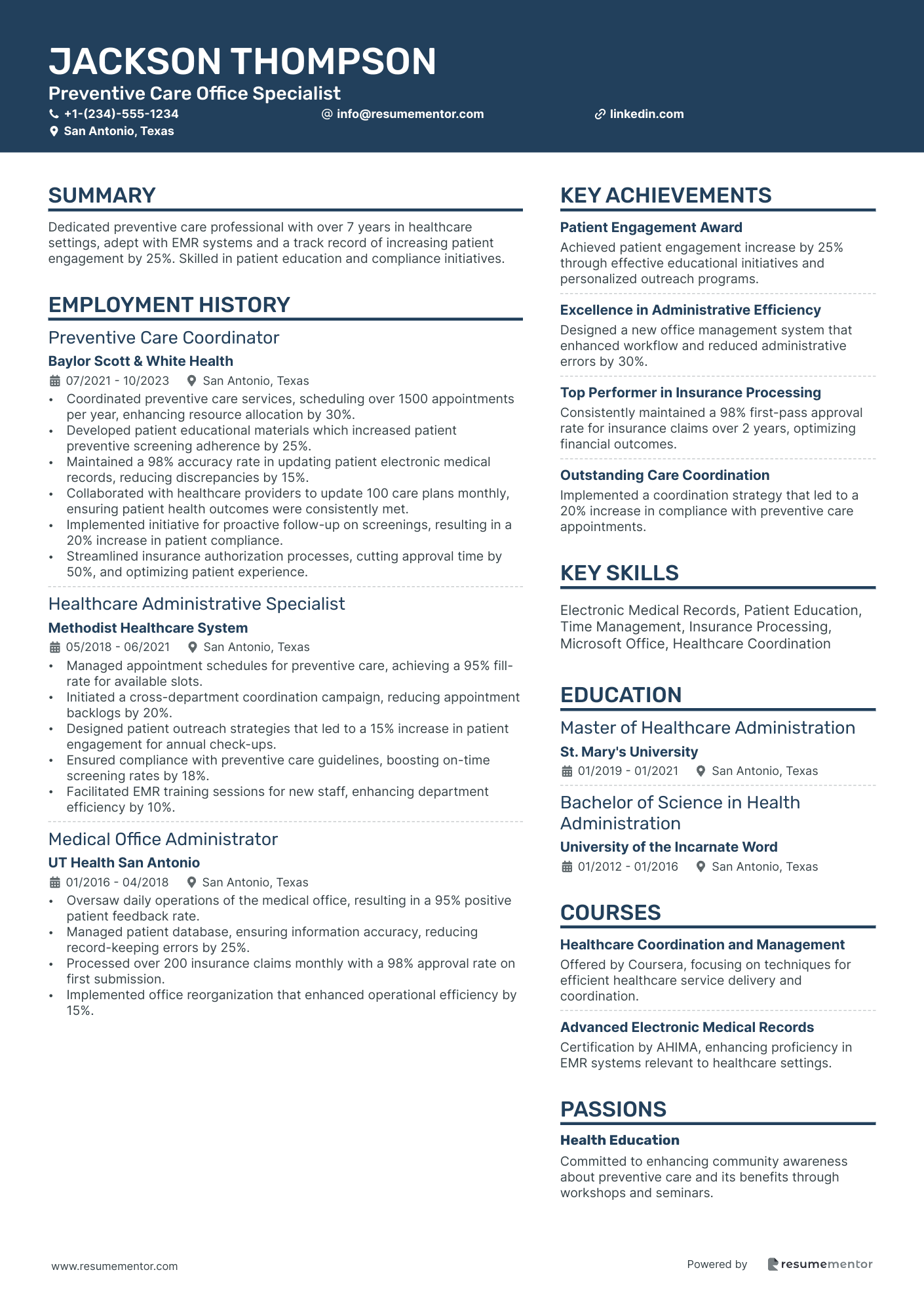
Preventive Care Office Specialist

Medical Billing and Coding Specialist resume sample
- •Implemented a streamlined billing process, increasing claims approval rates by 25% within the first year.
- •Managed a team of 5 billing assistants, resulting in a 15% boost in team productivity and morale.
- •Trained 10+ new hires on best practices for coding and claims submission, significantly reducing training times.
- •Conducted monthly audits of billing operations, decreasing discrepancies and errors by 30% over a year.
- •Collaborated with insurance representatives to resolve claim disputes, recovering $500K in previously denied claims.
- •Updated EHR systems to enhance data accuracy and efficiency, yielding a 20% reduction in data entry errors.
- •Reviewed and coded over 250 patient records weekly, maintaining a 98% accuracy rate.
- •Utilized ICD-10, CPT, and HCPCS coding systems to ensure precise billing and fast claims processing.
- •Reduced claim denial rates by 20% through diligent follow-up and proactive resolution approaches.
- •Maintained current knowledge of insurance policies and regulatory updates, applying best practices consistently.
- •Collaborated with a multidisciplinary team to resolve billing issues, optimizing patient satisfaction levels.
- •Prepared and submitted over 200 claims monthly, achieving a 90% first-time acceptance rate.
- •Developed a new filing system for billing documents, increasing team efficiency by 40%.
- •Interfaced with patients to explain billing procedures, enhancing patient understanding and satisfaction.
- •Supervised the implementation of new coding software, reducing processing times by 25%.
- •Assisted in coding over 300 patient records monthly, resulting in improved claim accuracy and speed.
- •Participated in a project that updated legacy billing systems, improving overall department efficiency.
- •Validated patient eligibility and benefits, enhancing insurance coverage accuracy and claims payment timeliness.
- •Provided feedback to improve patient records management processes, leading to a 15% increase in efficiency.
Clinical Documentation Specialist resume sample
- •Increased coding accuracy by 18% by developing a streamlined review process for clinical documentation, improving patient data integrity.
- •Collaborated with a multidisciplinary team to implement new documentation protocols, reducing audit discrepancies by 22% over a year.
- •Trained over 50 clinical team members on revised coding guidelines, leading to a 15% improvement in documentation compliance.
- •Conducted data analysis on documentation trends, revealing insights that decreased errors by 30% in treatment recordings.
- •Managed complex case reviews, ensuring detailed clinical documentation that enhanced billing accuracy by 25%.
- •Developed comprehensive feedback reports for senior management, resulting in strategic improvements to documentation processes.
- •Led clinical documentation audits, identifying improvement areas that enhanced compliance by 20% within six months.
- •Developed and implemented a successful clinical documentation improvement program impacting over 200 staff members.
- •Facilitated workshops on documentation standards, increasing awareness and reducing omissions by 40%.
- •Collaborated with IT to integrate EMR systems with updated coding protocols, improving efficiency in data entry tasks.
- •Provided concise, actionable feedback to physicians and nurses, boosting documentation accuracy rates by 12%.
- •Reviewed and assessed patient records for accuracy, achieving a 15% increase in documentation completeness.
- •Introduced new tools for measuring documentation quality, which enhanced reporting efficiency by 30%.
- •Coordinated with healthcare providers to resolve documentation errors, improving patient record reliability by 18%.
- •Actively participated in regulatory compliance meetings to stay current with changing healthcare documentation trends.
- •Analyzed complex datasets to identify patterns, resulting in a 10% improvement in healthcare delivery processes.
- •Collaborated with team members to develop new data collection methodologies, leading to improved data capture efficiency.
- •Conducted regular training sessions to onboard staff onto new EMR systems, decreasing learning curves by 25%.
- •Provided support on data structure improvements that led to a 15% reduction in record-keeping inaccuracies.
Pediatric Office Specialist resume sample
- •Greeted over 40 families daily, ensuring a warm welcome and efficient check-in process, leading to a 20% increase in patient satisfaction scores.
- •Managed insurance verification and payment collection for 500+ patients monthly, enhancing revenue collection accuracy by 25%.
- •Coordinated the appointment calendar with over 400 booked appointments a month, reducing scheduling conflicts by 30% through effective calendar management.
- •Maintained both physical and electronic patient records, achieving a 98% accuracy rate through meticulous data handling practices.
- •Assisted with preparing patient files, ensuring all necessary documents were ready for the medical staff before appointments, which decreased pre-appointment preparation time by 15%.
- •Trained 5 new administrative staff members on EHR systems and billing processes, significantly enhancing team productivity.
- •Directed the processing of referrals to specialists for over 300 patients per month, resulting in enhanced cross-departmental communication and reduced follow-up time by 20%.
- •Handled all inbound calls, resolving patient inquiries swiftly, which increased call resolution speed by 37%.
- •Played a key role in maintaining a clean and organized office environment, leading a team that ensured compliance with health regulations.
- •Implemented a new filing system resulting in a 25% reduction in document retrieval times and a more organized office.
- •Collaboratively coordinated with healthcare providers to improve patient care delivery, receiving commendations from patients for the process improvements.
- •Assisted clinical staff with basic tasks, routinely taking vital signs and preparing patients, contributing to a reduction of wait times by 15%.
- •Efficiently managed medical billing and coding, improving claim approval rates by 10% after implementation of new auditing procedures.
- •Trained in and utilized electronic health record systems, increasing records management efficiency by 20%.
- •Aided in maintaining up-to-date patient records, achieving a consistent accuracy rating of over 95% in record-keeping.
- •Communicated with patients and families to schedule appointments, leading to a 30% increase in patient follow-up visits.
- •Introduced a new patient check-in procedure that sped up the process by 15%, enhancing overall operational efficiency.
- •Handled patient inquiries with compassion and efficiency, maintaining high levels of patient satisfaction and trust.
Patient Services Specialist resume sample
- •Spearheaded patient intake and discharge protocols, improving efficiency by 20% and reducing wait times for 1,500 patients monthly.
- •Improved appointment scheduling accuracy by 30% through auditing practices, resulting in enhanced patient visit timeliness.
- •Implemented a new electronic reminder system that cut down missed appointments by 40%, raising clinic productivity.
- •Trained 10 new team members on HIPAA compliance and patient data management, maintaining a 100% adherence rate.
- •Resolved over 250 patient billing inquiries quarterly, achieving a 95% resolution satisfaction score among patients.
- •Collaborated with interdisciplinary teams to refine patient information processes, enhancing cross-departmental communication by 25%.
- •Processed patient information and insurance details with 99% accuracy, supporting the team in managing 3,200 patient records.
- •Developed and launched a patient feedback system, improving service offerings and increasing patient satisfaction scores by 35%.
- •Led a pilot project on digital forms implementation, resulting in a 50% reduction in paperwork processing times.
- •Successfully managed appointment reminders for 100 patients per week, optimizing clinic schedules and flow.
- •Proactively addressed 300 monthly patient inquiries, enhancing client relations and improving service response times by 15%.
- •Maintained electronic health records, achieving a 99.5% accuracy rate across 15,000 patient documents annually.
- •Collaborated with clinical staff to streamline document workflows, improving efficiency and reducing data entry errors by 15%.
- •Enhanced insurance claim processing speed by 40%, contributing to a 60% improvement in cash flow cycles.
- •Handled patient data corrections and updates, reducing administrative discrepancies by 20%.
- •Managed billing operations for over 500 monthly patient accounts, achieving a 98% accuracy rate in account reconciliation.
- •Improved patient understanding of co-payment procedures by designing informational brochures, reducing billing enquiries by 25%.
- •Assisted in the integration of new billing software, facilitating a seamless transition and reducing user error by 30%.
- •Analyzed patient payment trends and optimized collection practices, increasing monthly collection rates by 20%.
Medical Records Specialist resume sample
- •Led a project to digitize 95% of all patient records within six months, streamlining access for healthcare providers.
- •Implemented a new auditing system, reducing documentation errors by 20% and enhancing compliance with HIPAA regulations.
- •Collaborated with IT to improve electronic health record software, resulting in a 35% decrease in retrieval time.
- •Conducted training sessions for 50+ staff on new medical record procedures, boosting the team’s efficiency by 15%.
- •Reviewed and validated incoming medical records, ensuring 100% accuracy in patient histories and discharge summaries.
- •Contributed to a cross-functional team, leading to the successful revision of policies that increased patient data privacy by 40%.
- •Managed 5,000 patient medical records with strict adherence to privacy regulations, maintaining a 99% compliance rate.
- •Improved retrieval processes for clinical staff, resulting in a 25% increase in the speed of accessing critical information.
- •Developed and distributed comprehensive monthly statistical reports, aiding in strategic decision-making for department heads.
- •Oversaw the conversion of 10,000 paper records to electronic format, facilitating better data management.
- •Trained new hires in electronic health record systems, achieving a 10% reduction in onboarding time and increasing efficiency.
- •Initiated quality control processes for records, which decreased data entry errors by 15% across departments.
- •Managed a team of 5 in transitioning physical records to a secure digital system within a 9-month timeline.
- •Authored guidelines on new privacy laws compliance, contributing to an organization-wide training program and enhanced awareness.
- •Pioneered a verification system for incoming records, increasing accuracy rates by 10% over six months.
- •Assisted in the upkeep of 7,000 records while ensuring 100% compliance with federal and state regulations.
- •Played a key role in implementing an EHR system, enhancing clinic operations by reducing processing time by 30%.
- •Provided efficient support to healthcare providers by swiftly accessing and interpreting patient medical histories.
- •Assisted in the preparation of audit reports, which led to a 5% increase in operational efficiency.
Clinical Office Operations Specialist resume sample
- •Led clinical office operations, improving patient scheduling efficiency by 25% through optimized workflow management.
- •Acted as the primary contact for patients, enhancing patient satisfaction scores by 15% through tailored customer service approaches.
- •Streamlined communication between 10 clinical teams and insurance providers, significantly increasing billing accuracy by 18%.
- •Negotiated with suppliers, reducing medical supply costs by 20% while maintaining office resource availability.
- •Coordinated EHR system upgrades, ensuring a seamless transition with a compliance rate of 100% post-training.
- •Implemented new staff onboarding processes that decreased new hire training time by 50%.
- •Oversaw daily office operations, achieving a 30% improvement in appointment turnover through process adjustments.
- •Implemented a patient record auditing process which enhanced record accuracy by 28% through monthly checks.
- •Facilitated training sessions on new software, resulting in a 40% reduction in user-reported system errors over 6 months.
- •Managed inventory and reordered processes, reducing supply-related delays in patient care by 15%.
- •Developed and executed communication strategies resulting in a 10% rise in patient engagement within the first year.
- •Managed patient inquiries and coordinated care, maintaining a 95% customer satisfaction score in three consecutive annual reviews.
- •Streamlined clinic operations resulting in a 20% enhancement in patient throughput year-on-year.
- •Facilitated cross-departmental meetings leading to a 25% increase in collaborative care plans across departments.
- •Conducted monthly office audits identifying efficiency gaps, which led to a 15% reduction in administrative errors.
- •Assisted in everyday office activities, contributing to a 10% rise in overall office efficiency.
- •Ensured compliance with HIPAA protocols, maintaining a 100% secure management of patient records.
- •Managed appointment scheduling which enhanced patient satisfaction rates by 12% from consistent punctuality.
- •Supported the implementation of new scheduling software, reducing appointment booking times by 20%.
Dermatology Office Specialist resume sample
- •Enhanced patient intake efficiency by 30% through streamlined administrative processes, contributing to a 15% increase in daily patient volume.
- •Implemented a new EHR system, facilitating a 25% reduction in data entry errors and improving patient record accuracy.
- •Trained new administrative staff, resulting in a 50% faster onboarding process and higher team performance ratings.
- •Orchestrated appointment scheduling and coordination, achieving a 20% improvement in patient flow and reduced wait times.
- •Managed medical supply inventory, leading to a 40% reduction in stockouts and ensuring procedure readiness.
- •Assisted dermatologists in patient examinations, ensuring all materials and information were prepared in advance.
- •Reduced patient no-show rates by 20% through personalized reminder calls and follow-up scheduling methods.
- •Coordinated billing inquiries and improved claim resolutions leading to a 30% faster reimbursement process.
- •Provided excellent patient support, receiving a 95% satisfaction score in annual survey results.
- •Collaborated with the healthcare team to prioritize patient care tasks, enhancing service delivery by 15%.
- •Processed co-pays and maintained financial records with a 99% accuracy rate, contributing to seamless audits.
- •Verified insurance details for 30+ patients daily, ensuring precise billing and eligibility verification processes.
- •Updated patient records in accordance with HIPAA regulations, achieving a 98% compliance rate during audits.
- •Streamlined office communications, reducing message response times by 40% through effective coordination strategies.
- •Arranged specialist referrals, contributing to a 60% increase in interpractice patient transitions.
- •Provided comprehensive administrative support, including managing appointment calendars for multiple practitioners.
- •Maintained office filing systems, improving document retrieval times by 25% through effective organization.
- •Handled intake for new patients, facilitating a welcoming atmosphere and enhancing first impression satisfaction metrics.
Emergency Medical Office Specialist resume sample
- •Enhanced patient experience scores by 35% through innovative communication protocols and detailed follow-up procedures.
- •Led a cross-functional team in reorganizing office layout, boosting operational efficiency by 25% and reducing patient wait times.
- •Implemented new digital scheduling system resulting in a 15% increase in on-time appointments.
- •Conducted training sessions for staff, improving insurance claim submission accuracy by 20% over six months.
- •Developed a patient feedback program leading to adjustments in service offerings and a 10% increase in satisfaction scores.
- •Coordinated monthly staff meetings to streamline departmental processes, resulting in a 10% reduction in administrative errors.
- •Streamlined patient check-in procedures, reducing average wait time by 10 minutes and improving service efficiency.
- •Managed patient records for over 200 patients daily, ensuring compliance with healthcare privacy regulations.
- •Communicated effectively with over 50 insurance companies, reducing claim rejections by 15%.
- •Collaborated with medical staff to coordinate patient care, increasing referral follow-through by 20%.
- •Enhanced customer service ratings by 25% by implementing personalized patient interaction strategies.
- •Conducted medical documentation audits resulting in a 5% reduction in record-keeping errors.
- •Trained new office staff in using electronic health records systems, boosting team proficiency by 30%.
- •Managed inventory supplies, reducing cost overruns by 10% through strategic vendor negotiations.
- •Efficiently handled high-volume appointment scheduling, maintaining a 98% accuracy rate.
- •Facilitated communication between patients and insurance providers, increasing clarity and reducing misunderstandings by 40%.
- •Organized over 500 patient records swiftly and accurately, supporting improved office productivity.
- •Assisted in the development of office training materials, contributing to a 15% improvement in staff onboarding speed.
- •Handled all incoming correspondence, achieving a 99% timely response rate.
Ophthalmology Office Specialist resume sample
- •Streamlined appointment scheduling processes leading to a 20% increase in booking efficiency over a one-year period.
- •Revamped the patient check-in system, reducing wait times by 30%, enhancing overall patient flow.
- •Collaborated with clinical staff to coordinate patient care, increasing patient retention by 15% annually.
- •Digitized patient records within the EHR system, achieving a 25% reduction in data entry errors.
- •Developed and implemented a patient education program, raising post-operative care understanding by 40%.
- •Spearheaded an inventory management initiative, reducing order waste by 10%.
- •Managed patient intake processes, contributing to an improved service satisfaction score of 95%.
- •Designed and coordinated educational workshops, raising patient participation by 50% during my tenure.
- •Ensured accurate insurance verification procedures, resulting in improved billing collection rates by 10%.
- •Facilitated effective communication between patients and clinical staff, improving understanding of care plans.
- •Led a practice-wide initiative to enhance patient engagement, resulting in a 10% increase in positive feedback.
- •Processed over 1,000 patient records monthly with 99% accuracy in the EHR system.
- •Assisted in scheduling over 3,000 patient appointments annually, maintaining the highest standards of protocol adherence.
- •Collaborated with physicians to enhance patient flow, resulting in a 15% reduction in daily appointment backlogs.
- •Implemented a new filing system that improved document retrieval times by 25%.
- •Enhanced office operations through efficient scheduling and inventory management procedures.
- •Improved data entry processes in the medical records team, maintaining a 99% accuracy rate.
- •Managed a team of administrative assistants, fostering collaboration and improving office productivity by 20%.
- •Orchestrated patient data reviews for clinical studies, ensuring project compliance and accuracy.
Preventive Care Office Specialist resume sample
- •Coordinated preventive care services, scheduling over 1500 appointments per year, enhancing resource allocation by 30%.
- •Developed patient educational materials which increased patient preventive screening adherence by 25%.
- •Maintained a 98% accuracy rate in updating patient electronic medical records, reducing discrepancies by 15%.
- •Collaborated with healthcare providers to update 100 care plans monthly, ensuring patient health outcomes were consistently met.
- •Implemented initiative for proactive follow-up on screenings, resulting in a 20% increase in patient compliance.
- •Streamlined insurance authorization processes, cutting approval time by 50%, and optimizing patient experience.
- •Managed appointment schedules for preventive care, achieving a 95% fill-rate for available slots.
- •Initiated a cross-department coordination campaign, reducing appointment backlogs by 20%.
- •Designed patient outreach strategies that led to a 15% increase in patient engagement for annual check-ups.
- •Ensured compliance with preventive care guidelines, boosting on-time screening rates by 18%.
- •Facilitated EMR training sessions for new staff, enhancing department efficiency by 10%.
- •Oversaw daily operations of the medical office, resulting in a 95% positive patient feedback rate.
- •Managed patient database, ensuring information accuracy, reducing record-keeping errors by 25%.
- •Processed over 200 insurance claims monthly with a 98% approval rate on first submission.
- •Implemented office reorganization that enhanced operational efficiency by 15%.
- •Assisted in scheduling over 500 patient appointments monthly, optimizing appointment outcomes by 10%.
- •Streamlined patient inquiry responses, enhancing service resolution times by 30%.
- •Supported team in updating EMR system, which improved record-keeping efficiency by 20%.
- •Participated in developing patient outreach programs, resulting in a 12% uptick in preventive care participation.
As a medical office specialist, your resume is more than just a list; it’s the heartbeat of your professional journey, combining your organizational skills with your medical knowledge. When you’re navigating the job market, it’s easy to feel lost, much like wandering through a busy hospital corridor without a map. That’s where your resume comes in—it’s your guide, steering potential employers through your qualifications, experiences, and contributions.
Highlighting your diverse responsibilities can be challenging. From patient interactions to managing medical records, you need a resume that reflects both your administrative skills and medical expertise. A well-structured resume template can help you organize your achievements, letting you focus on the content rather than the format.
By clearly outlining your strengths, you make it easier for hiring managers to see how you excel in managing both patient care and office duties. It’s all about communicating your experience in a way that meets the specific needs of medical offices. The right template allows you to emphasize your expertise, efficiency, and dedication, turning your professional journey into a document that opens doors and propels your career forward.
Key Takeaways
- When crafting a teacher resume, ensure it clearly reflects your organizational skills, effective communication, and familiarity with educational administrative processes to connect your expertise with the recruiter's needs.
- Start with clear and essential contact information like your full name, phone number, and email, establishing a professional introduction to recruiters.
- In your professional summary, focus on your track record in managing educational tasks, thus setting the stage for showcasing your achievements and skills.
- Highlight both hard and soft skills separately to demonstrate your comprehensive abilities, ensuring you use job-specific keywords to align with employer expectations.
- Tailor your work experience section by tying specific examples of achievements to measurable outcomes, creating a compelling and digestible narrative for potential employers.
What to focus on when writing your medical office specialist resume
A medical office specialist resume should clearly communicate your organizational skills, effective communication, and familiarity with medical administrative processes to the recruiter—demonstrate how these abilities ensure a smooth-running medical office. Highlight your experience with scheduling, record keeping, and patient interaction in a way that is both straightforward and relatable. Connect your skills directly to the recruiter's needs for an efficient office environment, creating a narrative of competence and reliability.
How to structure your medical office specialist resume
- Contact Information — Start with your full name, phone number, email address, and city/state, making sure that your professional email matches your name. This basic yet vital section serves as your first introduction. Keeping this information clear and precise helps establish an immediate connection with the recruiter.
- Professional Summary — In the opening paragraph, you already shared your track record in managing medical administration tasks. Expand on this by detailing your skills in managing patient records, coordinating appointments, and handling billing processes efficiently. This summary acts as a quick snapshot of your qualifications and sets the stage for a deeper dive into your skills and experiences.
- Skills — Highlighting this section involves listing competencies that strongly support your professional summary, such as medical terminology, EHR proficiency, and insurance verification. Clearly demonstrating your technical and interpersonal abilities not only reinforces but also enhances the claims made in your professional summary.
- Work Experience — Describe past roles with a focus on key responsibilities like maintaining patient confidentiality, managing documentation, and engaging with both patients and medical staff. Concrete examples of improvements or efficiencies you implemented underscore your practical contributions to previous workplaces, thereby illustrating your impact and reliability.
- Education — List degrees or certifications that establish the foundation of your expertise, such as a Medical Office Administration certificate. Sharing the names of your institutions and graduation dates lends credibility to your background and complements your work history, reinforcing the skills and experience you've highlighted.
- Technical Proficiency — Finish by detailing experience with medical software like Epic, Medisoft, or Athenahealth. Emphasize your adaptability and ability to learn new systems quickly. This section paints a complete picture of your readiness to thrive in a tech-driven medical environment, underscoring your all-around capability.
Next, we will dive deeper into each section of the resume, exploring how to effectively format and present each part to create a compelling narrative for your next role as a medical office specialist.
Which resume format to choose
Creating a strong resume as a medical office specialist starts with selecting a format that showcases your skills effectively. The functional resume is particularly well-suited for this role as it highlights your competencies and experience in medical administration rather than just listing past job titles. This format helps you focus on what you do best, making it easier for hiring managers to see why you’re a good fit for their team.
When it comes to font choice, selecting Lato, Raleway, or Montserrat can enhance the readability and professional look of your resume. These modern fonts help keep the focus on your qualifications, ensuring that your resume is not only easy to read but also presents a polished and updated image. A clean and modern look is essential in the medical field, where precision and professionalism are highly valued.
Saving and sharing your resume as a PDF is crucial. This format locks in your formatting decisions, ensuring your resume looks the same no matter where it’s opened. PDFs are widely accepted and demonstrate attention to detail, something every medical office values highly. It ensures that all the effort you've put into formatting your content isn't lost in translation, presenting a consistent and professional image to potential employers.
Margins play a subtle but important role in how your resume is perceived. By keeping margins between 0.5 to 1 inch, you maintain a balance between text and white space, which enhances readability. This thoughtful spacing reflects the organized and detail-oriented nature expected in medical administrative roles, making your resume not just a document, but a reflection of your professional approach.
By focusing on each of these elements, you can create a resume that not only highlights your abilities as a medical office specialist but also aligns with the expectations and standards of the field, leading to better opportunities in your career path.
How to write a quantifiable resume experience section
In your medical office specialist resume, focus on showcasing your ability to manage a busy medical office with precision. Start with your most recent job and work backwards, covering the last 10-15 years, to provide a clear career progression. Tailor your experience to match the job ad by integrating relevant keywords and highlighting your achievements that align with the employer’s needs. Select roles that demonstrate growth and success in your career path. Use strong action words like “coordinated,” “improved,” and “managed” to effectively convey the impact you made. Tailoring further involves blending these keywords with your achievements to ensure they resonate with potential employers.
- •Cut patient wait times by 30%, boosting satisfaction and office efficiency.
- •Directed daily activities for a team of 10, streamlining processes to increase productivity.
- •Set up an electronic filing system, reducing document retrieval time by 40%.
- •Handled insurance billing, achieving 98% accuracy in claims processing.
This experience section is cohesive because it seamlessly highlights your ability to enhance medical office operations while also improving patient experience. Your quantified achievements demonstrate credible contributions, such as cutting wait times and increasing claim accuracy, making your impact clear and substantial. The use of specific metrics ties each bullet point back to practical improvements in the medical office, creating a compelling narrative for hiring managers. This format not only emphasizes your accomplishments but does so in a way that is easily digestible, making it an effective tool for showcasing your expertise and attracting potential employers.
Training and Development Focused resume experience section
A training and development-focused medical office specialist resume experience section should begin by highlighting your role in boosting the office's efficiency and educational strategies. Clearly state your responsibilities, focusing on training programs and activities that drove positive change. Emphasize how your efforts led to smoother operations and enhanced staff skills by showcasing the initiatives you launched or improved, which also resulted in cost reductions.
When detailing your achievements, use specific numbers to quantify your impact, like the percentage of improvements or the number of individuals trained. Each description should be concise and easy to understand, painting a vivid picture of your contribution. This approach allows hiring managers to easily recognize your positive impact and see how you could bring similar success to their organization.
Medical Office Specialist
Healthcare Excellence Clinic
June 2020 - Present
- Introduced a new onboarding process, cutting training time by 30%.
- Created a detailed training manual, boosting staff knowledge levels.
- Led monthly training sessions, enhancing employee skills by 25%.
- Worked with department heads to tailor training content, increasing overall efficiency.
Responsibility-Focused resume experience section
A responsibility-focused resume experience section should clearly showcase your ability to manage office operations and contribute to patient care as a medical office specialist. Begin by organizing your experiences around the most impactful tasks, using strong action verbs to illustrate how your efforts have enhanced office efficiency. Connect your achievements with specific examples that highlight improvements in systems or procedures, and back them up with numbers to underline the significance of your contributions.
Using bullet points will help bring clarity and focus to your accomplishments, making each responsibility or success easy to digest. Each bullet should flow logically from one to the next, illustrating how you met challenges head-on and improved office productivity. Incorporate facts or figures to paint a clear picture of the role you played and the value you added, ensuring your contributions are unmistakable.
Medical Office Specialist
Healthy Life Clinic
June 2020 - August 2023
- Managed daily office operations for a busy medical practice, boosting appointment efficiency by 30%
- Implemented a new electronic filing system, cutting paperwork processing time by 20%
- Trained new office staff, enhancing team productivity and collaboration
- Addressed patient inquiries with care, improving patient satisfaction scores
Innovation-Focused resume experience section
A medical office specialist resume experience section should highlight your innovative impact in transforming office practices. Begin by reflecting on how your unique solutions have enhanced everyday operations, like optimizing document management or refining appointment processes. Providing measurable outcomes, such as time saved or efficiency gains, can really underscore your achievements. This consistency in showcasing your proactive efforts demonstrates your ability to devise and implement effective strategies.
Connect the dots by illustrating the ripple effect of your innovations on both your team and patient care. Emphasizing these contributions shows how your innovations have not only improved workflows but also fostered a positive environment for both staff and patients. A clear and straightforward format lets your accomplishments shine, offering a comprehensive view of your problem-solving skills and dedication to improving the workplace.
Medical Office Specialist
Wellness Care Clinic
June 2020 - Present
- Developed and implemented an electronic filing system, cutting paperwork time by 35% and enhancing office efficiency.
- Streamlined appointment scheduling with a digital system, improving patient flow and significantly reducing wait times by 25%.
- Introduced a digital inventory management system, ensuring consistent supply availability and cutting annual costs by 15%.
- Led training sessions for staff on new software, which improved overall productivity and ensured everyone was up to speed on the latest tools.
Leadership-Focused resume experience section
A leadership-focused medical office specialist resume experience section should clearly present your ability to guide a team while ensuring efficient office operations. Start by sharing experiences where you demonstrated leadership, problem-solving, and a deep understanding of the healthcare setting. Highlight moments when you successfully managed a team or introduced improvements that resulted in smoother office operations. Focus on the positive outcomes, such as enhanced efficiency or increased patient satisfaction, to paint a vivid picture of your impact.
When detailing your roles, use dynamic language to draw attention to your accomplishments. Provide specific examples of projects you've led and changes you've made, ensuring that you connect them to measurable results, like reduced wait times or improved record accuracy. Presenting these achievements as bullet points keeps them clear and emphasizes your key contributions.
Medical Office Specialist
HealthCare Clinic
June 2018 - Present
- Led a team of 10 administrative staff members, boosting productivity by 15% through targeted training and mentorship.
- Implemented a new scheduling system that reduced patient wait times by 20% and improved overall clinic efficiency.
- Spearheaded a patient feedback program, resulting in a 30% increase in patient satisfaction scores.
- Streamlined electronic medical records management, increasing accuracy by 25% and lowering processing time.
Write your medical office specialist resume summary section
A skills-focused medical office specialist resume should start with a compelling summary that highlights your strengths and expertise clearly. This section is where you make your first impression, so keep it concise yet informative. A well-crafted summary gives hiring managers a quick glimpse into your capabilities and what you bring to the role. Consider this example for your summary:
This summary effectively ties your experience to the job's demands by focusing on your proven skills in managing records, scheduling, and maintaining confidentiality. It also highlights your commitment to excellent customer service and operational efficiency, crucial traits for success in a medical office.
Understanding how a resume summary differs from other sections is also key. A summary is perfect for those with relevant experience, offering a quick overview of your strengths. In contrast, a resume objective is better suited for those entering the field, focusing on your career aspirations and what you aim to accomplish in the role. A resume profile provides a more detailed narrative, whereas a summary of qualifications lists specific skills and achievements. By choosing the right format that aligns with your career stage, you can present your skills in the most effective way.
Listing your medical office specialist skills on your resume
A skills-focused medical office specialist resume should effectively highlight your abilities while seamlessly connecting them with other sections of your resume. You can choose to list your skills separately or integrate them into areas like your experience and summary. Highlighting both your strengths and soft skills demonstrates how well you work with others and approach challenges. Meanwhile, hard skills refer to specific, teachable abilities or knowledge necessary for the role, such as expertise in medical billing software.
Skills and strengths play a crucial role as resume keywords, allowing you to display your qualifications prominently and catch the attention of employers and applicant tracking systems. By using these keywords, specific to your job role like medical terminology proficiency or patient scheduling, you can ensure your resume stands out.
Here’s a JSON example of a standalone skills section, featuring key skills for a medical office specialist:
This section effectively lays out skills that are indispensable to a medical office specialist. Focusing on competencies like these, each skill is specifically chosen to align with the expectations of employers in the field.
Best hard skills to feature on your medical office specialist resume
Featuring strong hard skills on your resume means showing your technical abilities and specialized knowledge needed for office tasks. These skills highlight your capability to handle the demands of a medical office smoothly and accurately.
Hard Skills
- Medical billing and coding expertise
- Proficiency with Electronic Health Records (EHR) systems
- Patient scheduling and registration
- Insurance claims processing
- Knowledge of medical terminology
- Database management
- Understanding of HIPAA compliance
- Keyboarding and data entry proficiency
- Accurate financial account reconciliation
- Office equipment operation
- Appointment coordination
- Familiarity with patient management software
- Basic medical transcription understanding
- Excellent customer service in healthcare settings
- Email and calendar management
Best soft skills to feature on your medical office specialist resume
Soft skills are just as vital on a resume as they show how well you interact with patients and ensure seamless office operations. As a medical office specialist, these skills show your ability to communicate and resolve issues effectively.
Soft Skills
- Excellent communication skills
- Attention to detail
- Strong organizational abilities
- Problem-solving skills
- Multi-tasking capability
- Empathy and patient care
- Adaptability to changing tasks
- Time management
- Teamwork and collaboration
- Professionalism in demeanor and behavior
- Reliability and punctuality
- Stress management
- Positive attitude
- Conflict resolution
- Listening skills
How to include your education on your resume
The education section is an important part of your resume because it highlights your background and qualifications. It's crucial to tailor this section to the job you're applying for by focusing on relevant education. Irrelevant education can distract from your fit for the position, so it's best to leave it out. If including your GPA, do so if it's above 3.5, which showcases academic excellence. Listing cum laude honors (such as summa, magna, or cum laude) next to your degree demonstrates your high-achieving commitment. Clearly state your degree and the institution, ensuring clarity for the reader.
Here's a wrong example, which doesn't focus on the relevant education for a medical office specialist:
Now, observe a standout example that perfectly fits a medical office specialist role:
This second example is ideal because it directly relates to the medical field, highlights academic performance with a high GPA, and acknowledges the cum laude honor. This information immediately tells the employer about your relevant expertise and your dedication to excellence, making you a strong candidate for the role.
How to include medical office specialist certificates on your resume
Including a certificates section on your resume is crucial, especially if you are a medical office specialist. Certificates demonstrate your qualifications and can set you apart from other candidates. You can even mention certifications in the resume header for quick visibility. For example, "John Doe, Medical Office Specialist, CMA Certified."
List the name of each certificate you have earned. Include the date you received it. Add the issuing organization to give credibility. Ensure the certificates you choose highlight relevant skills. Focus on any certifications specific to medical office administration, like Certified Medical Administrative Assistant (CMAA) or Electronic Health Records Specialist.
This example is effective because it presents relevant certificates. It includes the name, issuer, and gives credibility by naming recognized organizations. The certifications specifically pertain to skills necessary for medical office specialists, showcasing your readiness for the role. Each entry offers direct insight into your professional qualifications. This clarity aids potential employers quickly assess your abilities.
Extra sections to include on your medical office specialist resume
Creating an effective resume as a medical office specialist involves more than just listing your skills and job history. It's important to provide a well-rounded picture of who you are professionally and personally. Here are some sections you might consider including in your resume, along with their benefits.
Language section — Add languages you speak to show your ability to communicate with diverse patients. This can increase your value in a multicultural work environment.
Hobbies and interests section — Include personal interests to show your balanced life and unique qualities. This makes you more relatable and memorable to employers.
Volunteer work section — Highlight volunteer activities to show your commitment to helping others and community service. Volunteer experience can demonstrate soft skills and dedication.
Books section — Share impactful books you’ve read to demonstrate your eagerness to learn and grow. This section can also reveal your interest in medicine and related fields.
These sections can enhance your resume by providing a fuller picture of you beyond your professional skills and experience, making you stand out to potential employers.
In Conclusion
In conclusion, creating a standout resume as a medical office specialist requires more than simply listing past jobs or education. It demands a comprehensive approach that showcases your organizational skills, technical know-how, and personal traits. Your resume should be a clear reflection of your ability to manage both the administrative and patient-facing aspects of a medical office. By using a structured template, you can efficiently highlight your proficiency in key areas like scheduling, patient interaction, and insurance processing.
A well-curated professional summary and detailed experience section are critical. These sections should clearly articulate your achievements, demonstrating not only your competence but also the tangible improvements you've brought to previous roles. Additionally, the choice of an appropriate resume format, such as a functional resume, enables you to emphasize your strengths effectively. Consider using modern fonts and formatting your document in PDF to ensure consistency and professionalism.
Don't overlook the impact of a thoughtfully presented skills section, blending both hard and soft skills essential for excellence in a medical setting. Complement this with specific educational certificates and extra sections such as volunteer work or language proficiency to round out your professional profile. By integrating these elements, your resume becomes a powerful tool that opens doors and sets you apart in the competitive medical office environment. With careful attention to detail and strategic presentation, you can create a comprehensive narrative that appeals to hiring managers and progresses your career path as a medical office specialist.
Related Articles

Continue Reading
Check more recommended readings to get the job of your dreams.
Resume
Resources
Tools
© 2026. All rights reserved.
Made with love by people who care.

